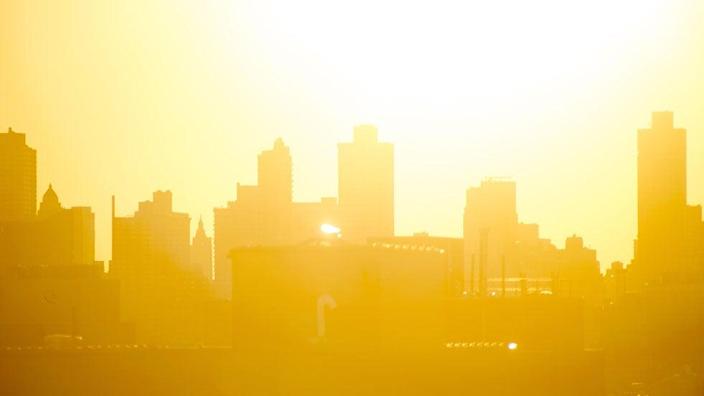
The United Nations’s climate science panel issued a report on Monday detailing both the impacts of climate change and potential adaptation measures society can take to mitigate the damage.
The report warned of dire impacts from global warming that will only get worse, from heat waves to food and water disruptions to damage to infrastructure.
Here are five major takeaways from the newest report.
Climate change’s impacts are worse than scientists expected – and some are irreversible
The latest report from the Intergovernmental Panel on Climate Change (IPCC) indicated that climate change’s impacts are worse than expected, a message that was echoed by its authors.
The report itself said that the “extent and magnitude of climate change impacts are larger than estimated in previous assessments,” citing issues including “widespread deterioration” of ecosystems.
“We’re seeing adverse impacts being much more widespread and being much more negative than expected in prior reports than expected at the current 1.09 degrees that we have,” Camille Parmesan, one of the report’s authors, told reporters on Sunday, referring to the current level of warming compared to pre-industrial levels.
Parmesan said that the world is seeing “diseases emerging into new areas” and “the first extinctions of species due to climate change” – effects not expected from the current level of warming.
The report itself also warned that some of the impacts already being seen are irreversible.
Other impacts, like water changes from glacier retreats and changes in mountain and Arctic ecosystems linked to melting permafrost are “approaching irreversibility,” the report said.
Climate change is already harming human health – and even killing people
The report warned of health risks from climate change, including from heat exposure, disease and mental health issues.
It said that globally, extreme heat events have already resulted in deaths. And it said that since the last time the IPCC issued a report in 2014, there have been more extreme events, including “heat-related human mortality,” that have been attributed to human-caused climate change.
It said that there would be more risks in the decades to come, particularly between 2040 and 2100.
“Climate change and related extreme events will significantly increase ill health and premature deaths from the near- to long-term,” said a summary of the panel’s findings.
It mentioned continued heat waves, as well as food-borne and water-borne disease risks and disease from pests like mosquitoes. It particularly warned of increases in the risk of diseases from a certain type of mosquito, “potentially putting additional billions of people at risk by the end of the century.”
And it warned of increased mental health issues such as anxiety and stress. Report author Sherilee Harper, when specifically asked about health events in North America, pointed to three ways it can impact mental health.
“One is direct impacts of people that are having to be evacuated from wildfires or flooded areas that obviously is associated with increased impacts on things like post-traumatic stress,” Harper said.
She said that it can also indirectly impact people’s mental health through stresses like food insecurity, and that they can experience climate change “vicariously” by seeing impacts to other people on the news.
The report warned of impacts from increased exposure to wildfire smoke, which can cause heart and lung problems. And it noted that health services have been disrupted because of extreme weather like floods.
Climate change is disrupting food, water and infrastructure systems
Climate change is already forcing changes to the food we eat, the water we drink and the infrastructure we build our lives around.
The report noted that climate change can worsen food and water insecurity. It gave several examples, noting impacts like ocean warming and acidification weakening fishing and shellfish harvests.
It also said that increasing extreme weather due to climate change has caused millions of people to face food insecurity and reduced water security. Instances of acute food insecurity and malnutrition have increased in Africa, Central America and South America.
It found that risks to physical water availability will increase in the mid- to long- term in every region it assessed, and these changes will be exacerbated by worsened warming.
The report particularly pointed to impacts on cities, saying that climate change has already negatively affected people, particularly already disadvantaged groups.
It cited heat waves and the impacts of extreme events on transportation, water, sanitation and energy infrastructure.
Going forward, the report warned that cities, especially in coastal areas, could face even greater risks, and that globally about a billion people will be at risk from coastal climate hazards in the mid-term.
A wide variety of solutions can help us adapt to climate change
The report called on the world to take a broad range of adaptation measures to lessen the impacts of climate change.
It called for forest conservation, including diversifying tree composition to resist impacts from pests and wildfires. For agriculture, it said farms and landscapes should be diversified, and that urban agriculture should be encouraged.
Because of sea level rise, the report called for protection, and even planned relocation in low-lying coastal cities.
For energy systems, it called for increased resilience, reliability, storage and efficiency as well as diversification, including through small-scale renewable energy.
Other measures it endorsed include plans for extreme heat warnings and responses, improved access to potable water in order to combat food- and water-borne disease, and warning systems and vaccine development for diseases from pests. It said that some of the mental health impacts can be mitigated through better access to care.
The climate impacts will be worse without action
The report highlighted the need to lessen climate-warming emissions, noting that impacts will be worse with greater temperature increases.
It gave a number of examples where climate change would deliver worse outcomes with higher levels of warming, including flooding and food insecurity.
Specifically, it said that if global warming becomes two degrees Celsius higher than pre-industrial levels in the mid-term, food insecurity risks will become worse, “leading to malnutrition and micro-nutrient deficiencies” in Sub-Saharan Africa, South Asia, Central and South America and small islands.
“This report reinforces the main findings that are actually emerging from all of our reports this cycle, and that is that every fraction of a degree of warming matters, and every action helps,” Ko Barrett, IPCC vice-chair, said in an interview.
“We’re in a race with the risks that are increasing as the planet warms and this report is really clear in saying that the ultimate solution lies in stopping the warming,” Barrett added.




